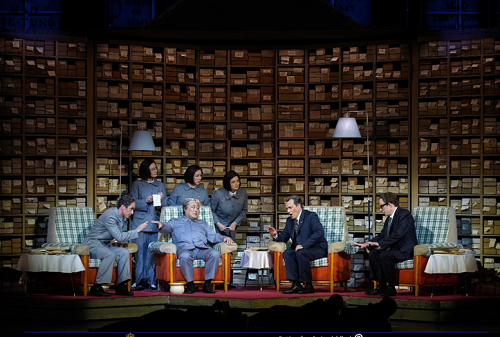 Spain John Adams, Nixon in China: Teatro Real Chorus and Orchestra / Olivia Lee-Gundermann (conductor). Teatro Real, Madrid, 24.4.2023. (JMI)
Spain John Adams, Nixon in China: Teatro Real Chorus and Orchestra / Olivia Lee-Gundermann (conductor). Teatro Real, Madrid, 24.4.2023. (JMI)

Production:
Director – John Fulljames
Sets and Costumes – Dick Bird
Lighting – Ellen Ruge
Choreography – John Ross
Video – Will Duke
Cast:
Richard Nixon – Leigh Melrose
Chou En-lai – Jacques Imbrailo
Pat Nixon – Sarah Tynan
Mao Tse-tung – Alfred Kim
Mme. Mao, Chiang Ch’ing – Audrey Luna
Henry Kissinger – Borja Quiza
Secretaries – Sandra Ferrández, Gemma Coma-Alabert and Ekaterina Antipova
This was the premiere of John Adams’s Nixon in China at Teatro Real and, in fact, its Spanish premiere. The first opera composed by Adams, it was followed by The Death of Klinghoffer and Doctor Atomic. Nixon in China was originally done in Houston in 1987, and it has never disappeared from programming, although one cannot say it has become a repertory opera.
President Nixon’s famous trip to China in 1972 was a shock to the world, in both political and economic terms, and it represented an important turn for modern history, because of the unexpectedness and of the consequences that followed. Neither China’s economic rise nor the changes in the former USSR could be understood without this trip by the US president.
The opera is quite appealing although it has its ups and downs – and an unimpressive ending, both dramatically and musically. There are three acts and six scenes, the first of which takes place at the Beijing airport with the arrival of the Nixons, who are received by Chinese Prime Minister Chou En-lai. The second scene deals with the private interview between Mao and Nixon, accompanied by Chou En-lai and Kissinger, which is concise and quite interesting. Act I ends with the official banquet that the Chinese premier dedicates to the Nixons and the subsequent toasts.

Act II features the strongest part of the opera in musical terms. In the first scene, Pat Nixon makes various visits in Beijing, and then the Nixons attend a ballet performance. With its high political charge, this is undoubtedly the best act in every sense. In Act III, in their respective bedrooms, the Nixons, the Maos and Chou En-lai recall their experiences. It all becomes rather unattractive in dramatic and musical terms, however – an unexpected ending for the viewer who is new to the opera.
The staging by John Fulljames – a Teatro Real, Royal Danish Opera, Scottish Opera co-production – had its premieres in Denmark (2019) and Scotland (2020), and it works reasonably well. There is a large open space at the front of the stage, while images of the Nixon trip (which coincide with what is happening on stage) are projected on the back wall. The entire ballet scene is brilliant, as is that of Pat Nixon’s visits. For the arrival at the Beijing airport, the presidential plane is replaced by a large staircase, down which the Nixons and their companions descend. The space dedicated to the interview with Mao Tse Tung is somewhat reduced.

The musical direction was in the hands of Olivia Lee-Gundermann, who replaced Ivor Bolton. I had never had the opportunity to see her conducting and had very little information about her background, apart from knowing that she had just conducted this opera in Dortmund. The truth is that she handled it all very well, taking care of both the pit and the stage and without falling into monotony at any time. Under her baton, the Orchestra and Chorus of Teatro Real both did nicely.
Richard Nixon was played by baritone Leigh Melrose, whose voice is well-suited to the part. He is also a good stage performer. The same can be said of baritone Jacques Imbrailo as Chou En-lai.
Possibly the most complete vocal performance was offered by tenor Alfred Kim as Mao Tse-tung, with a powerful voice and the ability to solve tessitura problems. Soprano Sarah Tynan impressed as Pat Nixon, particularly in her great scene that opens Act II, and light soprano Audrey Luna, who doubled as Madame Mao and Chiang Ch’ing, showed her ease on high notes.
Borja Quiza as Kissinger was correct in the role, as were Mao’s three secretaries, played by Sandra Ferrández, Gemma Coma-Alabert and Ekaterina Antipova.
José M. Irurzun
